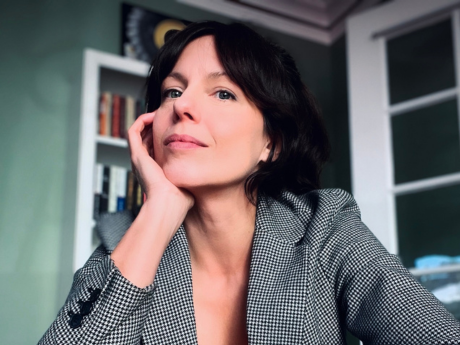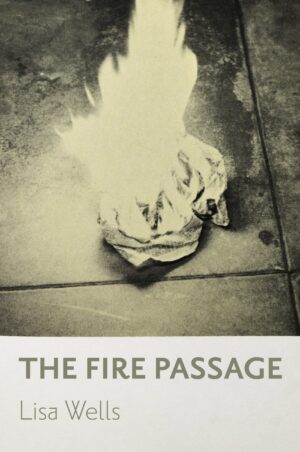from The Fire Passage
In Their Own Words
Lisa Wells on The Fire Passage

34.
Pilgrim, have you lately asked
what am I for?
To what purpose should I apply this borrowed corpus?
I desired to write a history of the wound
but it is.
We used to gather at the rim to weep into the crater.
Not filling it was the point.
mecum omnes plangite
for the old gods demoted to idols
in the drive toward unification.
Turned out I’d given my life to something too small.
Bilked by the bad pastor who asked
Which master do you serve?
Answer.
I served a derivative daddy-type.
Control was the chief delusion.
Numbed-out in managing
total compliance to the incursive agenda.
Went along to get along
and the hand that wounded me was my own.
38.
We will greet, on the road to Tar Sands, a man
of myriad chattering heads—addicted
to the freebased recremental whee of implosion.
Who has, for an opponent,
the meeting of middle-class reformists.
Are you waiting for the thrill jockey to get his fill
and climb down off us?
He will never get his fill.
He will never climb down off us.
Just ask the kids at Fort Mac
where threshers undo
the true name of Lake Athabasca.
Forgone, that we were all accomplice
but it’s not too late to turn
if you want to
cool your heels here on Earth.
Reprinted from The Fire Passage (Four Way Books, 2025) with the permission of the poet.
On The Fire Passage
The books I read as a girl taught me to dream like a dead man on a journey. My point of origin was the apartment I shared with my mother in a strip-mall studded wasteland, on the westernmost edge of an American backwater. Let’s call it “Aloha, Oregon.”
I spent my first three decades within twenty miles of that port: an entire lifetime. Then I died and moved to Iowa, where I passed a period of limbo hectored by ambitious specters who hadn’t yet realized they’d expired. We’d arrived on ships named The Divine Comedy, Gilgamesh, the Aeneid, Leaves of Grass, some had even crossed by The Bridge. Together we studied Wyatt’s irregular heartbeat, and the lachrymal unheimlich of “Mauricio the Eye Silva.” A strange time was had by all!
My final seminar was taught by the poet D.A. Powell on the topic of “Paranormalities.” We used an Ouija Board to contact the spirit of James Merrill, but he was a no show. Instead we talked to a woman poet, who’s name I did not recognize, though my hand was one of three on the planchette. The poet Simone Mele was seated in the outer ring and told me who the dead woman was. I was more embarrassed than curious, not to know a name—as evidenced by the fact that I do not know it now. Our noble task for the class was to manifest the record of spiritual encounters in words “funneled through the body and its motor-mechanism the mind.” This was my real beginning.
One year later, I was living alone on the seventh floor of an otherwise empty dormitory, roughly 8000 miles away. I’d scored a job teaching poetry to a bright and international group of undergraduates. On our inaugural class trip we acquired a bout of intestinal illness so violent we barely made it back to school in time for the start of classes. The young people recovered. Somehow, I never did. I grew thin, dizzy. My hair fell out. Nothing of concern emerged in my test results and I sensed that the doctors at Campus Health had begun to locate the origin of my ailments in that most notorious organ. I’d had trouble with the organ previously, so I took their word for it.
On my third visit, a kindly doctor searched my eyes and asked if I’d been sleeping. I had not. I woke many times a night, heart racing, to the slamming of the stairwell door in my empty building. A student later informed me it was a favorite place to hide out and smoke cigarettes. They were smokers not ghosts, and yet the haunting happened.
Because the campus was brand new, the library’s shelves were empty save for whatever texts were required that first term. Someone must have been teaching a class on the history of medicine, someone else the deep history of forests. For my part, I brought R.D. Laing’s the Divided Self in my carry on, and a page from the paranormal seminar, on which Prof Powell advised: “It wasn’t all that long ago in the minds of humankind that it was expected of a poet that she or he make a journey on our behalf to the other worlds.” I’d been so thick, but finally the task seeped in.
I lay awake reading The Sick Rose and Man and Wound in the Ancient World, writing the first draft, threadbare and led. And for the first time, I began to entertain the possibility that a poem could make something happen. It sounds like a bunch of windy bullshit concocted to sell a fundraising luncheon but hear me out. What if a poem could save my life? What if it were an actual map leading out of hell? What if the poem could resurrect the dead by the sheer force of its categorical assertions and manipulative music? What if a no-name woman wrote it? What if, in the end, the woman lived?



